Apollo Bay Resort Project: A Case Study Analysis for HOS302A Module
VerifiedAdded on 2022/11/19
|7
|1808
|382
Case Study
AI Summary
This case study examines the rejected plans for the Apollo Bay Resort, a proposed luxury development in Victoria, Australia. The analysis focuses on the macro-level impacts of the project, including the disturbance of ecological balance and risks related to flooding and bushfires. The study critiques the project's size and scale, which led to its rejection by the Victorian government. It further proposes three key strategies for the Oceans United Investment Group to gain shareholder support and potentially resubmit the development plan: trimming the project's size, selecting an alternative location, and implementing measures to prevent flood and bushfire damage. The conclusion emphasizes the importance of these strategies for the project's success, ensuring ecological balance and safety.
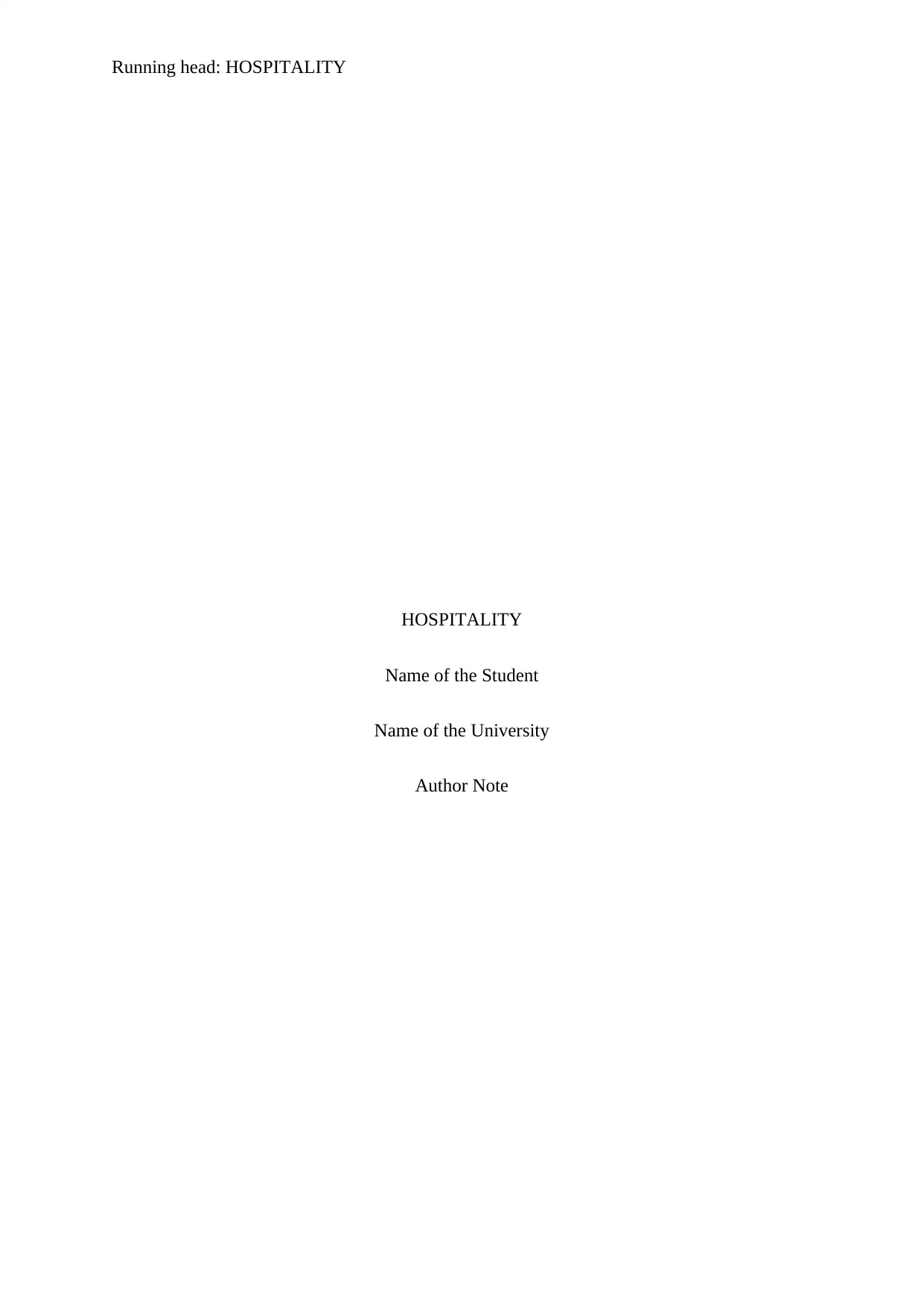
Running head: HOSPITALITY
HOSPITALITY
Name of the Student
Name of the University
Author Note
HOSPITALITY
Name of the Student
Name of the University
Author Note
Paraphrase This Document
Need a fresh take? Get an instant paraphrase of this document with our AI Paraphraser
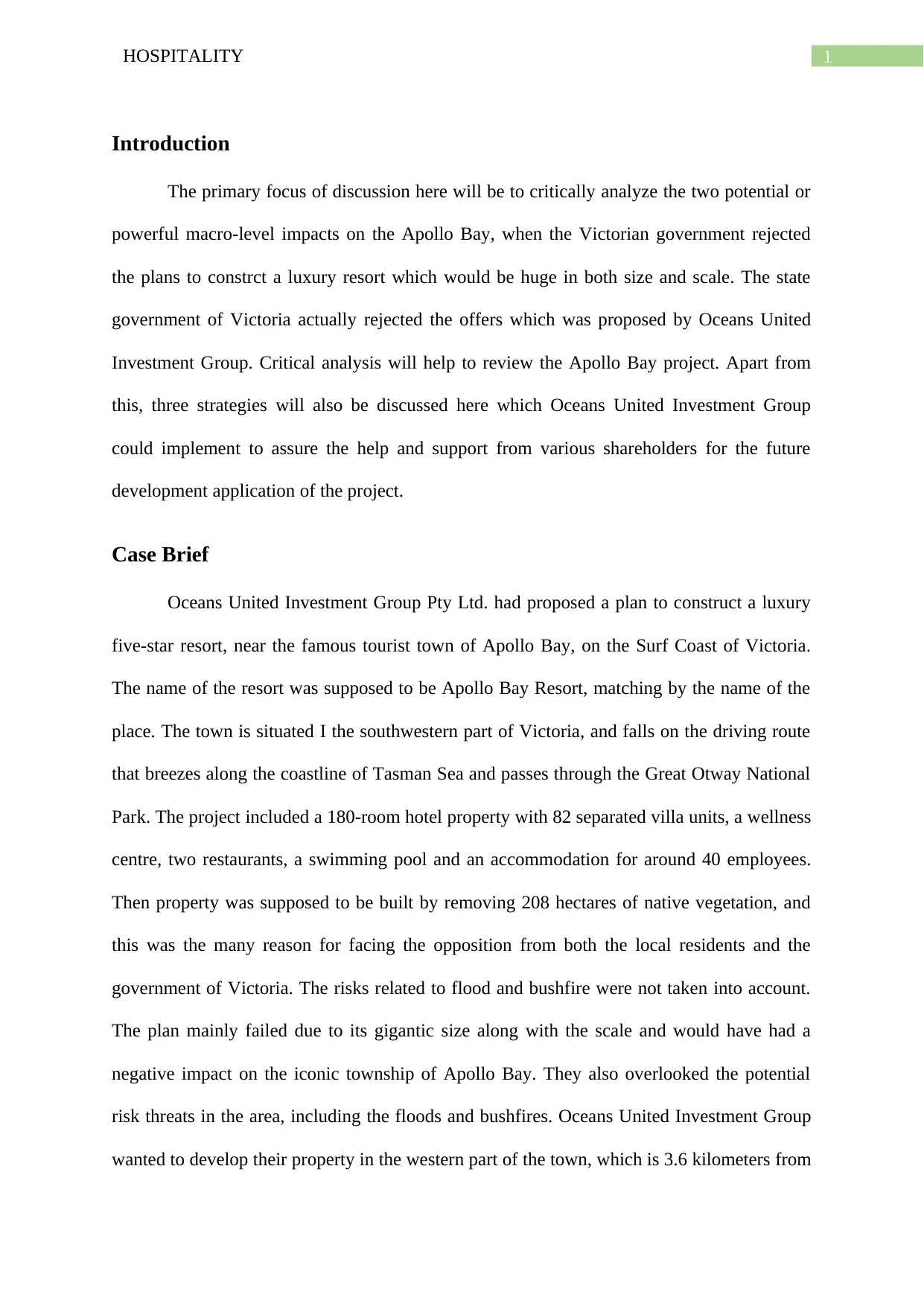
1HOSPITALITY
Introduction
The primary focus of discussion here will be to critically analyze the two potential or
powerful macro-level impacts on the Apollo Bay, when the Victorian government rejected
the plans to constrct a luxury resort which would be huge in both size and scale. The state
government of Victoria actually rejected the offers which was proposed by Oceans United
Investment Group. Critical analysis will help to review the Apollo Bay project. Apart from
this, three strategies will also be discussed here which Oceans United Investment Group
could implement to assure the help and support from various shareholders for the future
development application of the project.
Case Brief
Oceans United Investment Group Pty Ltd. had proposed a plan to construct a luxury
five-star resort, near the famous tourist town of Apollo Bay, on the Surf Coast of Victoria.
The name of the resort was supposed to be Apollo Bay Resort, matching by the name of the
place. The town is situated I the southwestern part of Victoria, and falls on the driving route
that breezes along the coastline of Tasman Sea and passes through the Great Otway National
Park. The project included a 180-room hotel property with 82 separated villa units, a wellness
centre, two restaurants, a swimming pool and an accommodation for around 40 employees.
Then property was supposed to be built by removing 208 hectares of native vegetation, and
this was the many reason for facing the opposition from both the local residents and the
government of Victoria. The risks related to flood and bushfire were not taken into account.
The plan mainly failed due to its gigantic size along with the scale and would have had a
negative impact on the iconic township of Apollo Bay. They also overlooked the potential
risk threats in the area, including the floods and bushfires. Oceans United Investment Group
wanted to develop their property in the western part of the town, which is 3.6 kilometers from
Introduction
The primary focus of discussion here will be to critically analyze the two potential or
powerful macro-level impacts on the Apollo Bay, when the Victorian government rejected
the plans to constrct a luxury resort which would be huge in both size and scale. The state
government of Victoria actually rejected the offers which was proposed by Oceans United
Investment Group. Critical analysis will help to review the Apollo Bay project. Apart from
this, three strategies will also be discussed here which Oceans United Investment Group
could implement to assure the help and support from various shareholders for the future
development application of the project.
Case Brief
Oceans United Investment Group Pty Ltd. had proposed a plan to construct a luxury
five-star resort, near the famous tourist town of Apollo Bay, on the Surf Coast of Victoria.
The name of the resort was supposed to be Apollo Bay Resort, matching by the name of the
place. The town is situated I the southwestern part of Victoria, and falls on the driving route
that breezes along the coastline of Tasman Sea and passes through the Great Otway National
Park. The project included a 180-room hotel property with 82 separated villa units, a wellness
centre, two restaurants, a swimming pool and an accommodation for around 40 employees.
Then property was supposed to be built by removing 208 hectares of native vegetation, and
this was the many reason for facing the opposition from both the local residents and the
government of Victoria. The risks related to flood and bushfire were not taken into account.
The plan mainly failed due to its gigantic size along with the scale and would have had a
negative impact on the iconic township of Apollo Bay. They also overlooked the potential
risk threats in the area, including the floods and bushfires. Oceans United Investment Group
wanted to develop their property in the western part of the town, which is 3.6 kilometers from
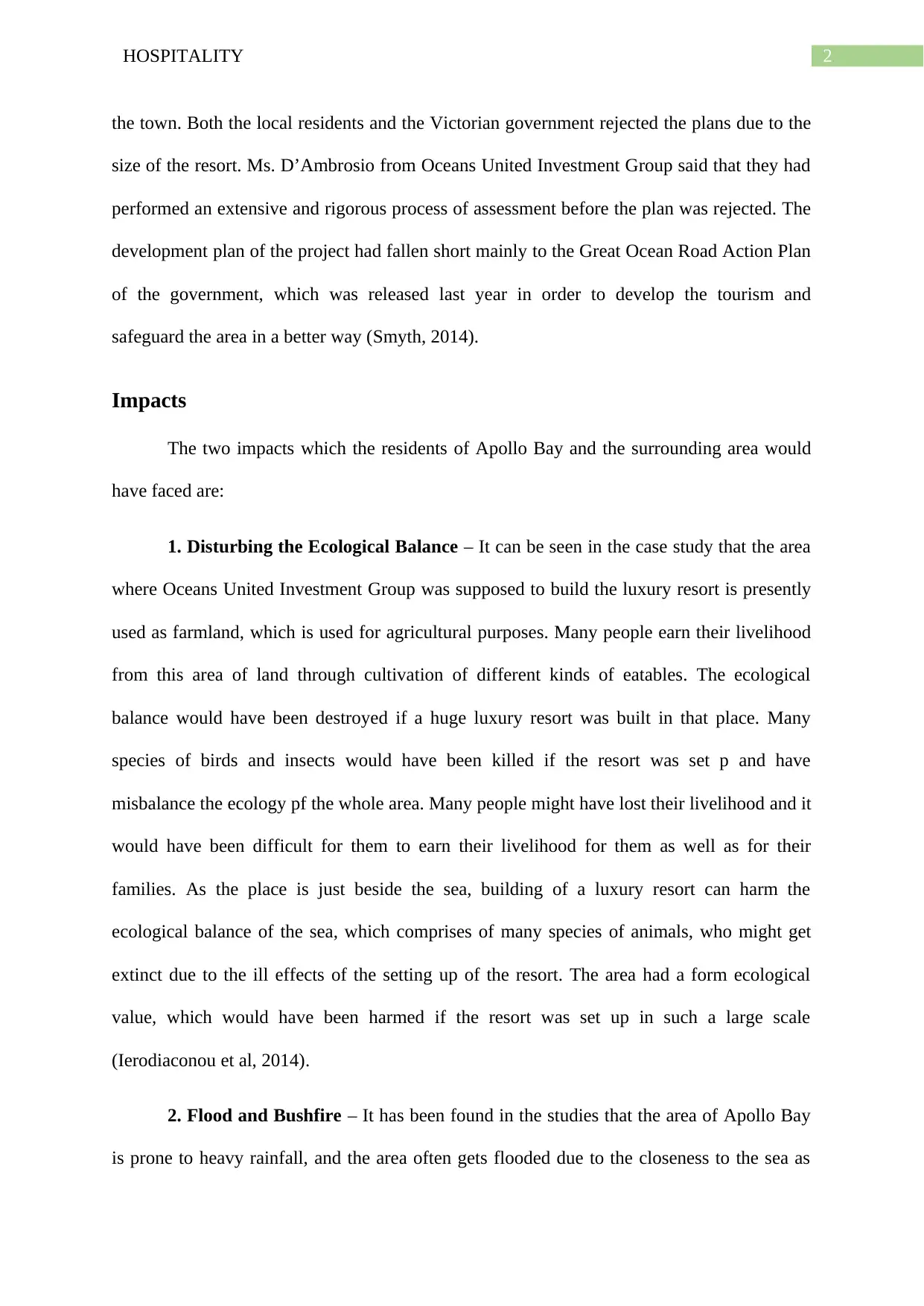
2HOSPITALITY
the town. Both the local residents and the Victorian government rejected the plans due to the
size of the resort. Ms. D’Ambrosio from Oceans United Investment Group said that they had
performed an extensive and rigorous process of assessment before the plan was rejected. The
development plan of the project had fallen short mainly to the Great Ocean Road Action Plan
of the government, which was released last year in order to develop the tourism and
safeguard the area in a better way (Smyth, 2014).
Impacts
The two impacts which the residents of Apollo Bay and the surrounding area would
have faced are:
1. Disturbing the Ecological Balance – It can be seen in the case study that the area
where Oceans United Investment Group was supposed to build the luxury resort is presently
used as farmland, which is used for agricultural purposes. Many people earn their livelihood
from this area of land through cultivation of different kinds of eatables. The ecological
balance would have been destroyed if a huge luxury resort was built in that place. Many
species of birds and insects would have been killed if the resort was set p and have
misbalance the ecology pf the whole area. Many people might have lost their livelihood and it
would have been difficult for them to earn their livelihood for them as well as for their
families. As the place is just beside the sea, building of a luxury resort can harm the
ecological balance of the sea, which comprises of many species of animals, who might get
extinct due to the ill effects of the setting up of the resort. The area had a form ecological
value, which would have been harmed if the resort was set up in such a large scale
(Ierodiaconou et al, 2014).
2. Flood and Bushfire – It has been found in the studies that the area of Apollo Bay
is prone to heavy rainfall, and the area often gets flooded due to the closeness to the sea as
the town. Both the local residents and the Victorian government rejected the plans due to the
size of the resort. Ms. D’Ambrosio from Oceans United Investment Group said that they had
performed an extensive and rigorous process of assessment before the plan was rejected. The
development plan of the project had fallen short mainly to the Great Ocean Road Action Plan
of the government, which was released last year in order to develop the tourism and
safeguard the area in a better way (Smyth, 2014).
Impacts
The two impacts which the residents of Apollo Bay and the surrounding area would
have faced are:
1. Disturbing the Ecological Balance – It can be seen in the case study that the area
where Oceans United Investment Group was supposed to build the luxury resort is presently
used as farmland, which is used for agricultural purposes. Many people earn their livelihood
from this area of land through cultivation of different kinds of eatables. The ecological
balance would have been destroyed if a huge luxury resort was built in that place. Many
species of birds and insects would have been killed if the resort was set p and have
misbalance the ecology pf the whole area. Many people might have lost their livelihood and it
would have been difficult for them to earn their livelihood for them as well as for their
families. As the place is just beside the sea, building of a luxury resort can harm the
ecological balance of the sea, which comprises of many species of animals, who might get
extinct due to the ill effects of the setting up of the resort. The area had a form ecological
value, which would have been harmed if the resort was set up in such a large scale
(Ierodiaconou et al, 2014).
2. Flood and Bushfire – It has been found in the studies that the area of Apollo Bay
is prone to heavy rainfall, and the area often gets flooded due to the closeness to the sea as
⊘ This is a preview!⊘
Do you want full access?
Subscribe today to unlock all pages.

Trusted by 1+ million students worldwide
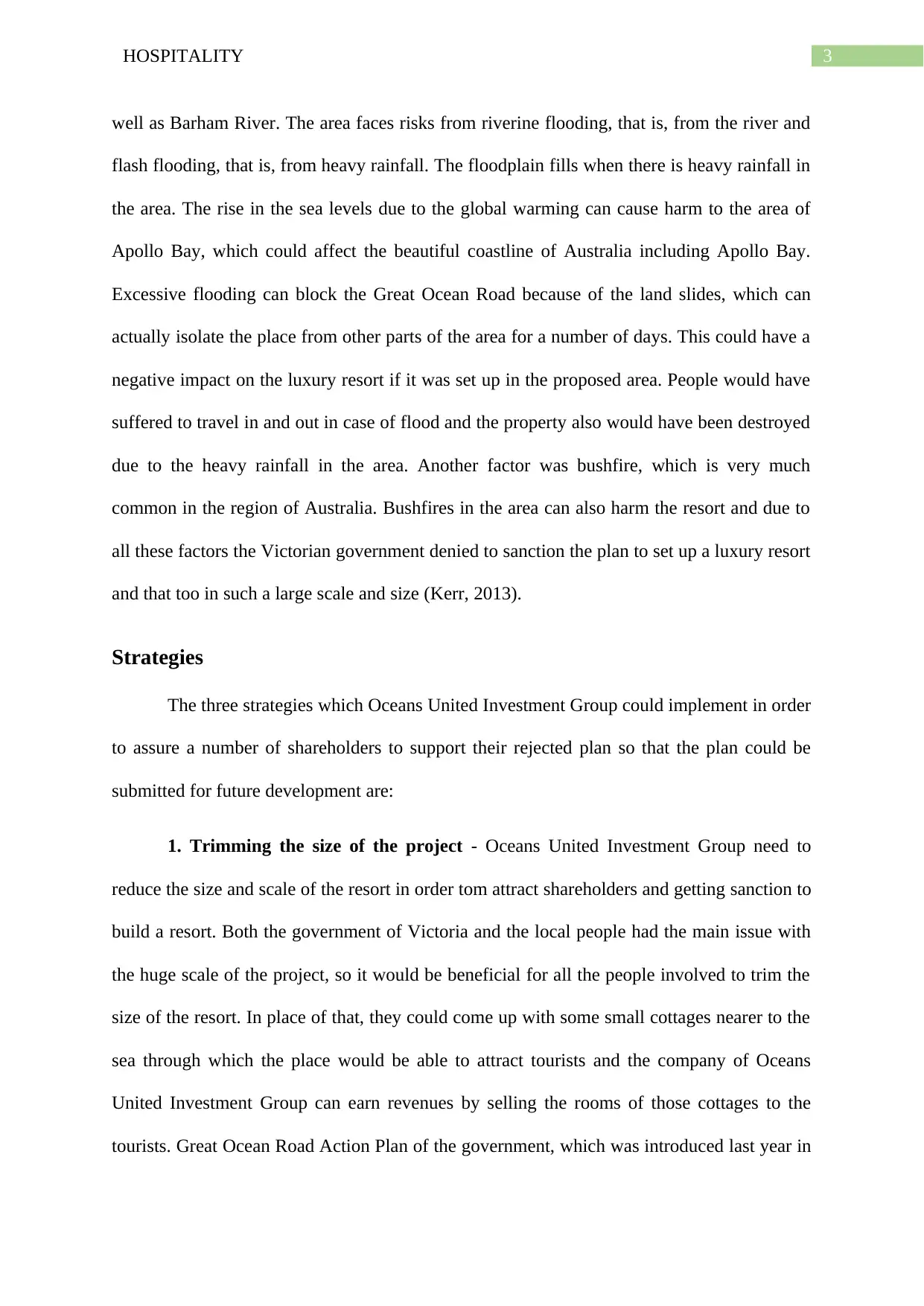
3HOSPITALITY
well as Barham River. The area faces risks from riverine flooding, that is, from the river and
flash flooding, that is, from heavy rainfall. The floodplain fills when there is heavy rainfall in
the area. The rise in the sea levels due to the global warming can cause harm to the area of
Apollo Bay, which could affect the beautiful coastline of Australia including Apollo Bay.
Excessive flooding can block the Great Ocean Road because of the land slides, which can
actually isolate the place from other parts of the area for a number of days. This could have a
negative impact on the luxury resort if it was set up in the proposed area. People would have
suffered to travel in and out in case of flood and the property also would have been destroyed
due to the heavy rainfall in the area. Another factor was bushfire, which is very much
common in the region of Australia. Bushfires in the area can also harm the resort and due to
all these factors the Victorian government denied to sanction the plan to set up a luxury resort
and that too in such a large scale and size (Kerr, 2013).
Strategies
The three strategies which Oceans United Investment Group could implement in order
to assure a number of shareholders to support their rejected plan so that the plan could be
submitted for future development are:
1. Trimming the size of the project - Oceans United Investment Group need to
reduce the size and scale of the resort in order tom attract shareholders and getting sanction to
build a resort. Both the government of Victoria and the local people had the main issue with
the huge scale of the project, so it would be beneficial for all the people involved to trim the
size of the resort. In place of that, they could come up with some small cottages nearer to the
sea through which the place would be able to attract tourists and the company of Oceans
United Investment Group can earn revenues by selling the rooms of those cottages to the
tourists. Great Ocean Road Action Plan of the government, which was introduced last year in
well as Barham River. The area faces risks from riverine flooding, that is, from the river and
flash flooding, that is, from heavy rainfall. The floodplain fills when there is heavy rainfall in
the area. The rise in the sea levels due to the global warming can cause harm to the area of
Apollo Bay, which could affect the beautiful coastline of Australia including Apollo Bay.
Excessive flooding can block the Great Ocean Road because of the land slides, which can
actually isolate the place from other parts of the area for a number of days. This could have a
negative impact on the luxury resort if it was set up in the proposed area. People would have
suffered to travel in and out in case of flood and the property also would have been destroyed
due to the heavy rainfall in the area. Another factor was bushfire, which is very much
common in the region of Australia. Bushfires in the area can also harm the resort and due to
all these factors the Victorian government denied to sanction the plan to set up a luxury resort
and that too in such a large scale and size (Kerr, 2013).
Strategies
The three strategies which Oceans United Investment Group could implement in order
to assure a number of shareholders to support their rejected plan so that the plan could be
submitted for future development are:
1. Trimming the size of the project - Oceans United Investment Group need to
reduce the size and scale of the resort in order tom attract shareholders and getting sanction to
build a resort. Both the government of Victoria and the local people had the main issue with
the huge scale of the project, so it would be beneficial for all the people involved to trim the
size of the resort. In place of that, they could come up with some small cottages nearer to the
sea through which the place would be able to attract tourists and the company of Oceans
United Investment Group can earn revenues by selling the rooms of those cottages to the
tourists. Great Ocean Road Action Plan of the government, which was introduced last year in
Paraphrase This Document
Need a fresh take? Get an instant paraphrase of this document with our AI Paraphraser
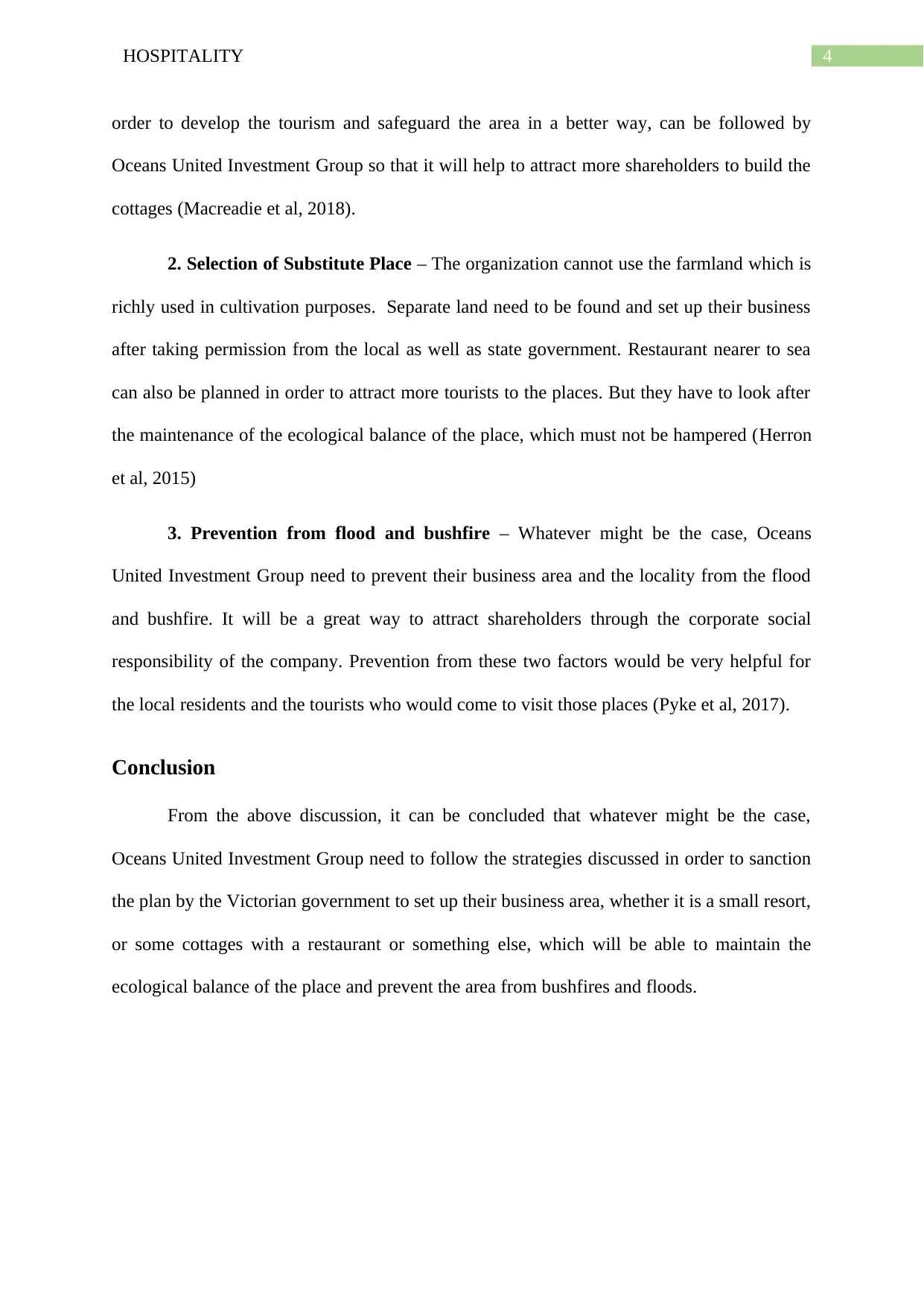
4HOSPITALITY
order to develop the tourism and safeguard the area in a better way, can be followed by
Oceans United Investment Group so that it will help to attract more shareholders to build the
cottages (Macreadie et al, 2018).
2. Selection of Substitute Place – The organization cannot use the farmland which is
richly used in cultivation purposes. Separate land need to be found and set up their business
after taking permission from the local as well as state government. Restaurant nearer to sea
can also be planned in order to attract more tourists to the places. But they have to look after
the maintenance of the ecological balance of the place, which must not be hampered (Herron
et al, 2015)
3. Prevention from flood and bushfire – Whatever might be the case, Oceans
United Investment Group need to prevent their business area and the locality from the flood
and bushfire. It will be a great way to attract shareholders through the corporate social
responsibility of the company. Prevention from these two factors would be very helpful for
the local residents and the tourists who would come to visit those places (Pyke et al, 2017).
Conclusion
From the above discussion, it can be concluded that whatever might be the case,
Oceans United Investment Group need to follow the strategies discussed in order to sanction
the plan by the Victorian government to set up their business area, whether it is a small resort,
or some cottages with a restaurant or something else, which will be able to maintain the
ecological balance of the place and prevent the area from bushfires and floods.
order to develop the tourism and safeguard the area in a better way, can be followed by
Oceans United Investment Group so that it will help to attract more shareholders to build the
cottages (Macreadie et al, 2018).
2. Selection of Substitute Place – The organization cannot use the farmland which is
richly used in cultivation purposes. Separate land need to be found and set up their business
after taking permission from the local as well as state government. Restaurant nearer to sea
can also be planned in order to attract more tourists to the places. But they have to look after
the maintenance of the ecological balance of the place, which must not be hampered (Herron
et al, 2015)
3. Prevention from flood and bushfire – Whatever might be the case, Oceans
United Investment Group need to prevent their business area and the locality from the flood
and bushfire. It will be a great way to attract shareholders through the corporate social
responsibility of the company. Prevention from these two factors would be very helpful for
the local residents and the tourists who would come to visit those places (Pyke et al, 2017).
Conclusion
From the above discussion, it can be concluded that whatever might be the case,
Oceans United Investment Group need to follow the strategies discussed in order to sanction
the plan by the Victorian government to set up their business area, whether it is a small resort,
or some cottages with a restaurant or something else, which will be able to maintain the
ecological balance of the place and prevent the area from bushfires and floods.
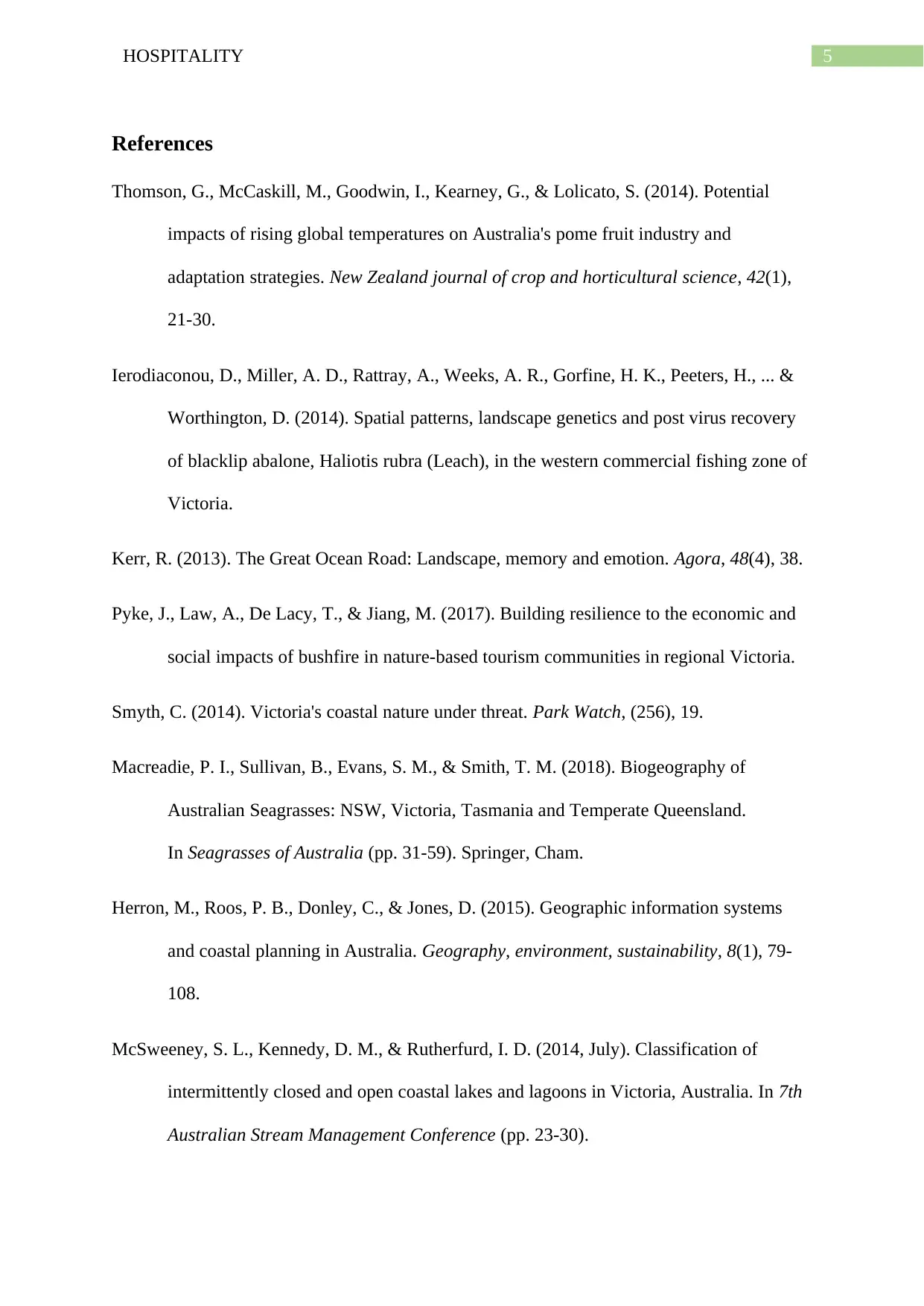
5HOSPITALITY
References
Thomson, G., McCaskill, M., Goodwin, I., Kearney, G., & Lolicato, S. (2014). Potential
impacts of rising global temperatures on Australia's pome fruit industry and
adaptation strategies. New Zealand journal of crop and horticultural science, 42(1),
21-30.
Ierodiaconou, D., Miller, A. D., Rattray, A., Weeks, A. R., Gorfine, H. K., Peeters, H., ... &
Worthington, D. (2014). Spatial patterns, landscape genetics and post virus recovery
of blacklip abalone, Haliotis rubra (Leach), in the western commercial fishing zone of
Victoria.
Kerr, R. (2013). The Great Ocean Road: Landscape, memory and emotion. Agora, 48(4), 38.
Pyke, J., Law, A., De Lacy, T., & Jiang, M. (2017). Building resilience to the economic and
social impacts of bushfire in nature-based tourism communities in regional Victoria.
Smyth, C. (2014). Victoria's coastal nature under threat. Park Watch, (256), 19.
Macreadie, P. I., Sullivan, B., Evans, S. M., & Smith, T. M. (2018). Biogeography of
Australian Seagrasses: NSW, Victoria, Tasmania and Temperate Queensland.
In Seagrasses of Australia (pp. 31-59). Springer, Cham.
Herron, M., Roos, P. B., Donley, C., & Jones, D. (2015). Geographic information systems
and coastal planning in Australia. Geography, environment, sustainability, 8(1), 79-
108.
McSweeney, S. L., Kennedy, D. M., & Rutherfurd, I. D. (2014, July). Classification of
intermittently closed and open coastal lakes and lagoons in Victoria, Australia. In 7th
Australian Stream Management Conference (pp. 23-30).
References
Thomson, G., McCaskill, M., Goodwin, I., Kearney, G., & Lolicato, S. (2014). Potential
impacts of rising global temperatures on Australia's pome fruit industry and
adaptation strategies. New Zealand journal of crop and horticultural science, 42(1),
21-30.
Ierodiaconou, D., Miller, A. D., Rattray, A., Weeks, A. R., Gorfine, H. K., Peeters, H., ... &
Worthington, D. (2014). Spatial patterns, landscape genetics and post virus recovery
of blacklip abalone, Haliotis rubra (Leach), in the western commercial fishing zone of
Victoria.
Kerr, R. (2013). The Great Ocean Road: Landscape, memory and emotion. Agora, 48(4), 38.
Pyke, J., Law, A., De Lacy, T., & Jiang, M. (2017). Building resilience to the economic and
social impacts of bushfire in nature-based tourism communities in regional Victoria.
Smyth, C. (2014). Victoria's coastal nature under threat. Park Watch, (256), 19.
Macreadie, P. I., Sullivan, B., Evans, S. M., & Smith, T. M. (2018). Biogeography of
Australian Seagrasses: NSW, Victoria, Tasmania and Temperate Queensland.
In Seagrasses of Australia (pp. 31-59). Springer, Cham.
Herron, M., Roos, P. B., Donley, C., & Jones, D. (2015). Geographic information systems
and coastal planning in Australia. Geography, environment, sustainability, 8(1), 79-
108.
McSweeney, S. L., Kennedy, D. M., & Rutherfurd, I. D. (2014, July). Classification of
intermittently closed and open coastal lakes and lagoons in Victoria, Australia. In 7th
Australian Stream Management Conference (pp. 23-30).
⊘ This is a preview!⊘
Do you want full access?
Subscribe today to unlock all pages.

Trusted by 1+ million students worldwide
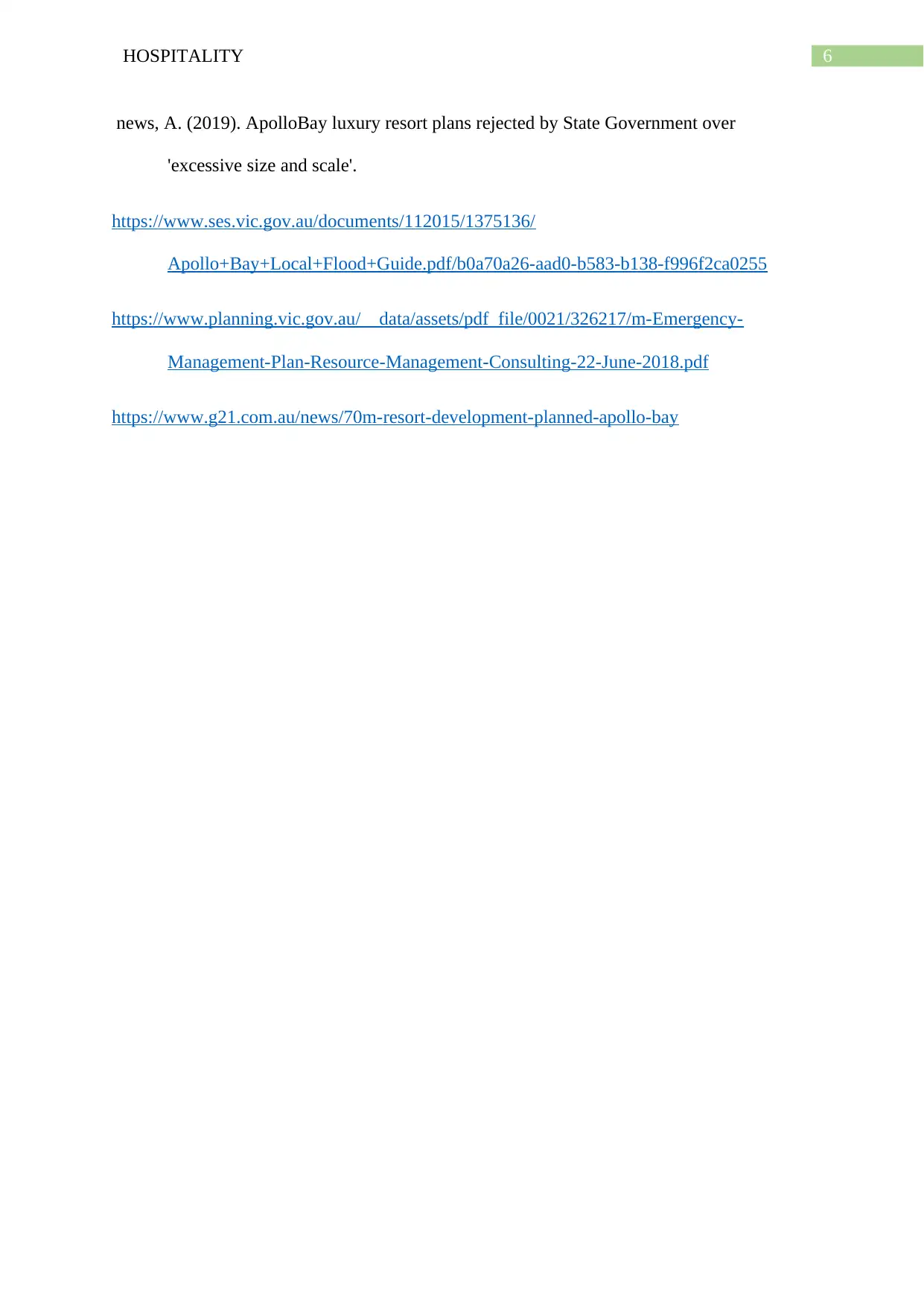
6HOSPITALITY
news, A. (2019). ApolloBay luxury resort plans rejected by State Government over
'excessive size and scale'.
https://www.ses.vic.gov.au/documents/112015/1375136/
Apollo+Bay+Local+Flood+Guide.pdf/b0a70a26-aad0-b583-b138-f996f2ca0255
https://www.planning.vic.gov.au/__data/assets/pdf_file/0021/326217/m-Emergency-
Management-Plan-Resource-Management-Consulting-22-June-2018.pdf
https://www.g21.com.au/news/70m-resort-development-planned-apollo-bay
news, A. (2019). ApolloBay luxury resort plans rejected by State Government over
'excessive size and scale'.
https://www.ses.vic.gov.au/documents/112015/1375136/
Apollo+Bay+Local+Flood+Guide.pdf/b0a70a26-aad0-b583-b138-f996f2ca0255
https://www.planning.vic.gov.au/__data/assets/pdf_file/0021/326217/m-Emergency-
Management-Plan-Resource-Management-Consulting-22-June-2018.pdf
https://www.g21.com.au/news/70m-resort-development-planned-apollo-bay
1 out of 7
Your All-in-One AI-Powered Toolkit for Academic Success.
+13062052269
info@desklib.com
Available 24*7 on WhatsApp / Email
![[object Object]](/_next/static/media/star-bottom.7253800d.svg)
Unlock your academic potential
Copyright © 2020–2025 A2Z Services. All Rights Reserved. Developed and managed by ZUCOL.
